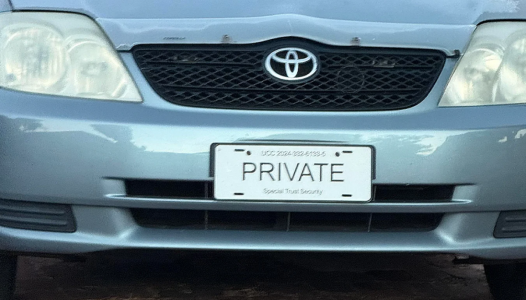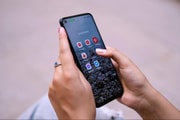Controversial number plate trick sparks warnings and $933 fine
By
Gian T
- Replies 0
As vehicles move through city streets, number plates typically follow a standard format to maintain consistency and compliance.
However, occasionally, a driver tests the limits of what is permitted, and a recent incident has drawn attention, raising questions and prompting warnings about possible repercussions.
Authorities have reminded motorists of the importance of adhering to regulations to avoid penalties.
The vehicle in question, a Toyota, was sporting a number plate that boldly declared 'PRIVATE,' with the smaller text 'Special Trust Security' beneath it.
This unconventional display caught the eye of a local who snapped a photo and shared it online, prompting a flurry of speculation and concern.
The immediate question on everyone's lips was, 'Surely, this can't be legal?'
The online community didn't hold back, with many quick to point out the apparent invitation for police attention that such a plate represents.
One commenter noted that these plates would 'guarantee SAPOL will pull them over at their first opportunity.'
At the same time, another speculated that the driver might be a member of the so-called 'sovereign citizen' movement.
This group, often seen as fringe conspiracists, operates under the belief that they can opt out of laws that they disagree with.
The South Australia Police (SAPOL) quickly responded to the online buzz. A SAPOL spokesperson confirmed that such plates are illegal and carry a hefty on-the-spot fine of $933.
'These plates appear fake and are not plates that have been issued by SA Department for Infrastructure and Transport,' the spokesperson clarified.
The online community quickly criticised the driver's blatant disregard for the law, with one person remarking on the driver's 'dreadful understanding [of the law]' and others joking about the plates being a magnet for police attention.
This isn't the first instance of such a scenario on Australian roads.
Earlier in 2023, a photo from Queensland showed a Holden with a plate that read 'Private Property Non-Commercial, Living Woman, Terra Australia Incognito' and included a false claim of a $50,000 fine for plate removal.
Interestingly, this plate also had a legitimate registration number but was in extremely small text.
The 'sovereign citizen' movement isn't just a quirky roadside oddity; it has the potential to be quite dangerous.
Dr Ben Rich, co-director of Curtin University's Curtin Extremism Research Network (CERN), expressed concern over the movement's growth, mainly as extremist American ideas have influenced it and were further fueled by the COVID-19 lockdowns.
The movement's members have been known to engage in anti-lockdown and anti-government protests, sometimes with a violent edge.
For our readers, it's crucial to understand the importance of adhering to the legal standards for number plates.
Not only do legitimate plates ensure that your vehicle is identifiable for safety and administrative purposes, but they also prevent you from facing unnecessary fines or legal trouble.
If you're considering customising your number plate, it's best to check with your state's transport department to understand what is and isn't allowed.
And remember, while expressing individuality can be appealing, it's not worth the risk of a $933 fine or the potential for more serious consequences.
In other news, a rare early-1900s South Australian number plate is set to surpass $1 million at auction.
The coveted No. 8 plate was owned initially by Arthur Earnest Ayers, son of Sir Henry Ayers, in 1906. You can read more about it here.
 Have you ever encountered an unusual number plate on the road? Or perhaps you've considered customizing your own? Share your thoughts and experiences with us in the comments below.
Have you ever encountered an unusual number plate on the road? Or perhaps you've considered customizing your own? Share your thoughts and experiences with us in the comments below.
However, occasionally, a driver tests the limits of what is permitted, and a recent incident has drawn attention, raising questions and prompting warnings about possible repercussions.
Authorities have reminded motorists of the importance of adhering to regulations to avoid penalties.
The vehicle in question, a Toyota, was sporting a number plate that boldly declared 'PRIVATE,' with the smaller text 'Special Trust Security' beneath it.
This unconventional display caught the eye of a local who snapped a photo and shared it online, prompting a flurry of speculation and concern.
The immediate question on everyone's lips was, 'Surely, this can't be legal?'
The online community didn't hold back, with many quick to point out the apparent invitation for police attention that such a plate represents.
One commenter noted that these plates would 'guarantee SAPOL will pull them over at their first opportunity.'
At the same time, another speculated that the driver might be a member of the so-called 'sovereign citizen' movement.
This group, often seen as fringe conspiracists, operates under the belief that they can opt out of laws that they disagree with.
The South Australia Police (SAPOL) quickly responded to the online buzz. A SAPOL spokesperson confirmed that such plates are illegal and carry a hefty on-the-spot fine of $933.
'These plates appear fake and are not plates that have been issued by SA Department for Infrastructure and Transport,' the spokesperson clarified.
The online community quickly criticised the driver's blatant disregard for the law, with one person remarking on the driver's 'dreadful understanding [of the law]' and others joking about the plates being a magnet for police attention.
This isn't the first instance of such a scenario on Australian roads.
Earlier in 2023, a photo from Queensland showed a Holden with a plate that read 'Private Property Non-Commercial, Living Woman, Terra Australia Incognito' and included a false claim of a $50,000 fine for plate removal.
Interestingly, this plate also had a legitimate registration number but was in extremely small text.
The 'sovereign citizen' movement isn't just a quirky roadside oddity; it has the potential to be quite dangerous.
Dr Ben Rich, co-director of Curtin University's Curtin Extremism Research Network (CERN), expressed concern over the movement's growth, mainly as extremist American ideas have influenced it and were further fueled by the COVID-19 lockdowns.
The movement's members have been known to engage in anti-lockdown and anti-government protests, sometimes with a violent edge.
For our readers, it's crucial to understand the importance of adhering to the legal standards for number plates.
Not only do legitimate plates ensure that your vehicle is identifiable for safety and administrative purposes, but they also prevent you from facing unnecessary fines or legal trouble.
If you're considering customising your number plate, it's best to check with your state's transport department to understand what is and isn't allowed.
And remember, while expressing individuality can be appealing, it's not worth the risk of a $933 fine or the potential for more serious consequences.
In other news, a rare early-1900s South Australian number plate is set to surpass $1 million at auction.
The coveted No. 8 plate was owned initially by Arthur Earnest Ayers, son of Sir Henry Ayers, in 1906. You can read more about it here.
Key Takeaways
- An Adelaide Toyota driver was fined after being caught with a fake number plate reading 'PRIVATE' along with other text suggesting sovereign citizen affiliations.
- SAPOL (South Australia Police) spokesman confirmed the plates are highly illegal and can attract a $933 on-the-spot fine.
- The illegal plates have prompted criticism and discussion online, with some linking the plates to the sovereign citizen movement.
- Police and intelligence agencies in Australia are concerned about the sovereign citizen movement, which events like the COVID-19 lockdowns have emboldened.








